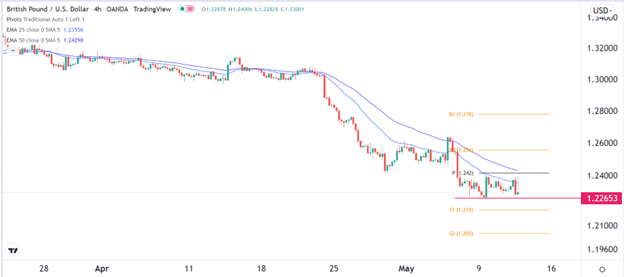Bearish View
- Set a sell-stop at 1.2265 and a take-profit at 1.2180.
- Add a stop-loss at 1.2400.
- Timeline: 1-2 days.
Bullish View
- Set a buy-stop at 1.2350 and a take-profit at 1.2425.
- Add a stop-loss at 1.2280.
The GBP/USD pair is in a consolidation phase after the better-than-expected US inflation data and ahead of the UK GDP numbers. It is trading at 1.2300, which is close to the lowest level this month. The pair has crashed by more than 6.5% from its highest level in April.
UK GDP Data Ahead
The UK economy is slowing down as the rising inflation continues to hamper the Covid recovery. Recent data revealed that the country’s retail sales plummeted in March while consumer inflation remains at elevated levels. Also, there are some challenges emerging in the resilient housing sector.
When making its interest rate decision last week, the Bank of England warned that recession risks were rising. It also warned that more rate hikes were necessary in a bid to fight the soaring inflation. Like the Fed, the bank is walking a thin line of reducing inflation while preventing a recession.
The Office of National Statistics (ONS) will publish important economic numbers today. Economists expect these numbers to show that the country’s trade deficit narrowed from 20 billion pounds to 18.5 billion pounds. In the same period, expectations are that the economy barely grew in March as prices rose.
The other important numbers to watch will be the March construction output, industrial production, and manufacturing production. These numbers will have limited impact on the GBP/USD pair.
The GBP/USD pair is also rangebound as investors assess the ongoing inflation trends. While gas and oil prices are at elevated levels, there are signs that inflation is nearing a peak. For example, data published by the US Bureau of Labor Statistics showed that the American inflation declined in April for the first time in eight months. The same trend could happen in the UK.
GBP/USD Forecast
The GBP/USD pair has been in a tight range in the past few days. It is trading at 1.2300, which is slightly above this week’s low of 1.2265. The price has moved between the pivot point and the first support. The downward trend is still being supported by the 25-day and 50-day moving averages. It has also formed what looks like a small bearish flag pattern.
Therefore, the outlook of the pair is neutral with a bearish bias. If this happens, the next key support level to watch will be at 1.2190. The stop-loss for this trade is at 1.2400.

